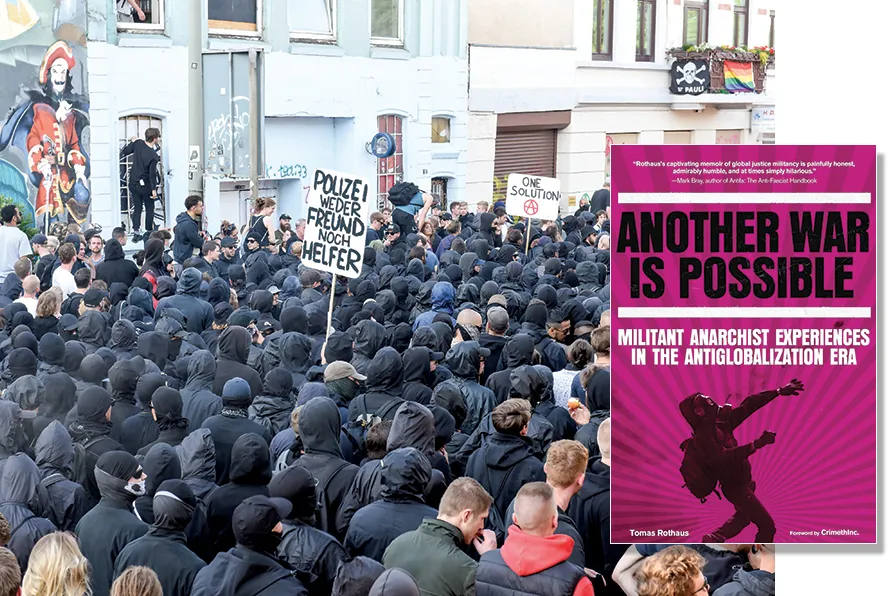RITA DI SANTO draws attention to a new film that features Ken Loach and Jeremy Corbyn, and their personal experience of media misrepresentation
Error message
An error occurred while searching, try again later.RON JACOBS rides shotgun with a member of Black Bloc on the wave of anti-capitalist protests of the 1990s and early 2000s

 SINGLE MINDEDNESS: The Black Block in Hamburg at the G20 summit in 2017, the placard reads: ‘The police are neither friends nor helpers’ [Pic: Thorsten Schroder/CC]
SINGLE MINDEDNESS: The Black Block in Hamburg at the G20 summit in 2017, the placard reads: ‘The police are neither friends nor helpers’ [Pic: Thorsten Schroder/CC]
Another War is Possible: Militant Anarchist Experiences in the Antiglobalization Era
Tomas Rothaus, PM Press, £26.99
IT seems so long ago, but the movement against global capitalism that featured mass protests against meetings of capital’s biggest criminals and powerbrokers (usually one and the same) had centre stage a mere 25 years ago. For those who participated, it was an exhilarating time filled with confrontation, conversation, debate and determination represented by the decision of so many to risk prison and injury. It was also a time that saw the forces of law and order show the reality of capitalism.
Although the bulk of the protests involved non-violent direct action and civil disobedience, there were also incidents of property destruction and fighting with police and vigilantes. Much of the latter was attributed to a phenomenon that became known as the black bloc. Say what you like about the black bloc and its tactics, they certainly revealed the brutality behind the veneer of culture and decency that liberal capitalism hides behind.
The members of the black bloc identified as anarchists.
Like any political philosophy, the term anarchism is a big umbrella. However, if one were to generalise, suffice to say that anarchy rejects the state in all of its forms, rejects the capitalist economy and believes in the self-organisation of the workers, peasants, students and intellectuals. Mutual aid is one of its essential elements and profit is something to be eliminated.
There are certain anarchists who believe technology to be the curse of humanity, while others — and I would argue that it is this definition which is truest to historical anarchism — consider themselves to be libertarian socialists or council communists. This element considers the workers and small farmers as the essential class in society and it is through their organisation into an anti-capitalist movement of local communes and confederations of those communes that a genuine revolution against capital and its political systems must occur.
Historically, the power of anarchists has lain in the industrial strike and the propaganda of the deed.
Back to 1995. This is when the author Tomas Rothaus begins his story. He is in Athens, Greece, struggling to get by, but not overly concerned as he watches street battles between police and anarchists on television. A few pages and a few months later he is in Paris fighting fascists and police; the reader more or less riding shotgun as Rothaus describes city after city and protest after protest.
The first several protests are anti-fascist and pro-migrant. He zigs and zags across France. As he lays out his narrative, Rothaus introduces friends and discusses the politics of the movement, the black bloc and those who require thousands of police to protect them during meetings intended to maximise their profit no matter what the human cost.
It’s an interesting juxtaposition of revolutionary adventure and human greed; youthful insurrection and fascist police; radical humanitarian hope and capitalist brutality in the name of humanity.
The author continues his story with a brief segue discussing the massive protests of late autumn 1999 in Seattle against the World Trade Organisation. Although he didn’t attend those days of rebellion, he rightly pegs them as the announcement of the anti-capitalist globalisation movement on the world stage.
A little more than a month later in January 2001 he was in the streets of Washington, DC, for the inauguration of George W Bush. A few months later, Rothaus is describing a border crossing from Vermont to Canada on the way to the March 2001 protests against the Free Trade Area of the Americas (FTAA) summit in Quebec City north of Montreal.
The FTAA was a plan to eliminate or reduce trade barriers among all countries in the Americas except for Cuba. The idea was to create the largest free-trade zone in the world, stretching from Alaska to Patagonia and the primary beneficiaries of the agreement would be US corporations and financial institutions. Rothaus describes the protests in detail, describing moments when his group broke through police lines, when they were joined by locals and when they pissed off the locals for bringing police repression to places the cops had ignored previously.
Rothaus continued his journey all the way to Genoa and what turned out to be the last of the big protests against the summits of the bosses of capitalism. It was only a few weeks later that the events of September 11 2001 took place in Manhattan, Virginia and Pennsylvania and provided those bosses with the perfect rationale to intensify their transition to fascism — a process that continues with even greater intensity today.
Another War is Possible is history, memoir, social critique, and perhaps even something of a coming-of-age story, both for the author and the movement he participated in then and chronicles in this text. Its honesty reminds the reader who was around then of the debates and quarrels about tactics, targets and the protesters themselves, especially the black bloc. That same honesty provides the rest of the readers with a reminder that to be part of a social movement against the powerful and the fascists is never static, occasionally joyful, sometimes stressful and always important.
Ron Jacobs’ latest book, titled Nowhere Land: Journeys Through a Broken Nation, is now available. He lives in Vermont. He can be reached at: ronj1955@gmail.com










